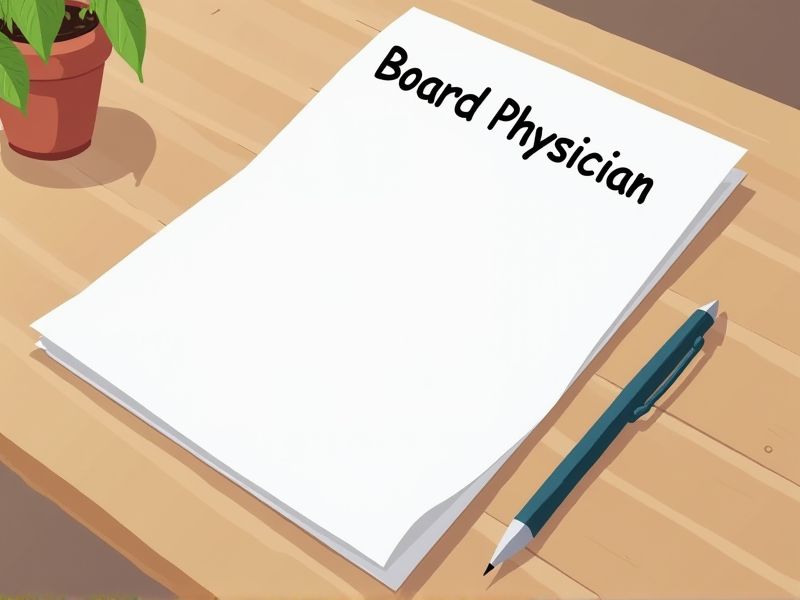
Board Physicians operate within a highly specialized and regulated environment, where precision in medical knowledge directly impacts patient outcomes. Certifications ensure these physicians possess the necessary expertise to assess and manage complex medical scenarios effectively. The evolving landscape of healthcare standards demands that Board Physicians continually update their skills to align with current medical practices and patient safety guidelines. Here are some important certifications required for a Board Physician.
American Board Certification in Medical Specialties
American Board Certification in Medical Specialties ensures that a physician meets nationally recognized standards, which boosts patient trust in their expertise. It also indicates that the physician has kept up with the latest medical advancements, maintaining quality care. Many hospitals and healthcare organizations require board certification as a hiring criterion, influencing career opportunities for physicians. It helps standardize the level of medical knowledge and practice across various specialties, promoting consistency in healthcare delivery.
Advanced Cardiac Life Support (ACLS) Certification
ACLS certification equips board physicians with essential skills to manage and treat cardiovascular emergencies, thereby reducing mortality rates in critical situations. As medical protocols constantly evolve, ACLS training ensures physicians stay updated on the latest life-saving techniques and algorithms. Hospitals and medical institutions often require board-certified physicians to have ACLS credentials to ensure a standardized approach to cardiac emergencies. Physicians with ACLS certification demonstrate a commitment to professional development, enhancing their credibility and trust among patients and peers.
Basic Life Support (BLS) Certification
Basic Life Support (BLS) Certification equips board physicians with essential skills to address life-threatening emergencies effectively, thereby increasing patient survival rates. BLS training ensures standardized response tactics, which are crucial in maintaining the patient's condition until advanced care becomes available. The certification bolsters a physician's credibility and demonstrates a commitment to maintaining high clinical standards. Continuous BLS education keeps physicians updated on the latest medical guidelines and procedural advancements, enhancing patient care quality.
Advanced Trauma Life Support (ATLS) Certification
The ATLS Certification equips board physicians with a systematic approach to managing trauma patients, a necessity given that trauma is a leading cause of morbidity and mortality. Certification ensures physicians remain current with the best practices in initial assessment and resuscitation, enhancing patient care quality. With trauma scenarios demanding quick and accurate decision-making, the proficiency gained through ATLS can significantly elevate patient outcomes and survival rates. Maintaining ATLS Certification signals commitment to continued professional development and adherence to international standards in trauma care, establishing trust with colleagues and patients.
Pediatric Advanced Life Support (PALS) Certification
Pediatric Advanced Life Support (PALS) Certification equips board physicians with specialized skills to handle emergencies in infants and children effectively. The certification enhances their ability to integrate advanced interventions and protocols into pediatric care, which improves patient outcomes. Board physicians with PALS Certification are more prepared to recognize and respond to cardiovascular and respiratory crises, minimizing fatal outcomes. Employers often require or prefer this certification to ensure comprehensive and uniform pediatric emergency care standards.
Certification in Clinical Quality and Patient Safety
Certification in Clinical Quality and Patient Safety equips board physicians with essential skills to identify and mitigate potential risks in healthcare settings, directly enhancing patient outcomes. Enhanced knowledge in this area fosters a culture of quality improvement, leading to more efficient care delivery and increased patient satisfaction. Certification ensures physicians are up-to-date with the latest safety protocols and guidelines, which is crucial for maintaining compliance with regulatory standards. This credential also strengthens the physician's role as a leader in multidisciplinary teams focused on minimizing harm and improving the overall healthcare experience.
Certified Physician Executive (CPE) Certification
The CPE Certification enhances leadership skills, enabling board physicians to effectively manage healthcare teams and systems. It signifies expertise in both clinical knowledge and executive management, bridging gaps between medical practice and administrative responsibilities. Employers often value CPE Certification, which can lead to career advancement opportunities for physicians wanting to transition into leadership roles. The certification process also provides extensive networking opportunities, fostering collaboration and innovation in healthcare management.
Certification in Medical Informatics
Certification in Medical Informatics equips board physicians with essential knowledge to effectively integrate technology into patient care, enhancing diagnostic and treatment processes. As healthcare increasingly relies on digital systems, certified physicians can better manage electronic health records, leading to increased efficiency and accuracy in patient data handling. Navigating the complex landscape of healthcare IT requires specialized skills that certification provides, ensuring physicians remain adept with evolving digital tools. With data-driven decision-making becoming central in healthcare, a certification ensures physicians can leverage informatics competencies to improve patient outcomes and operational efficiencies.
Certification in Geriatric Medicine
An aging population leads to an increased demand for healthcare providers skilled in managing complex health issues common in older adults. Certification in Geriatric Medicine equips board physicians with specialized knowledge to address age-related diseases effectively. Such certification enhances the quality of patient care by focusing on individualized treatment plans for elderly patients. Institutional requirements often mandate certified personnel to ensure adherence to best practices in geriatric healthcare.
Certification in Pain Medicine
Certification in Pain Medicine equips board physicians with specialized skills to better diagnose and manage complex pain conditions. This certification enhances a physician's credibility, attracting patients seeking expert pain management solutions. Comprehensive training in pain medicine helps reduce the risk of misdiagnosis and improper treatment, improving patient outcomes. Certified physicians often access a wider range of professional opportunities, contributing to career advancement and professional growth.
Summary
When you engage with a Board Physician holding additional certifications, enhanced trust and confidence in their expertise generally follows. Certifications can lead physicians to access advanced knowledge and skills, refining their ability to diagnose and treat effectively. Patients often experience improved outcomes due to more accurate diagnoses and targeted treatments. The healthcare facility benefits from elevated standards and practices, potentially boosting its reputation and attracting more clientele.
